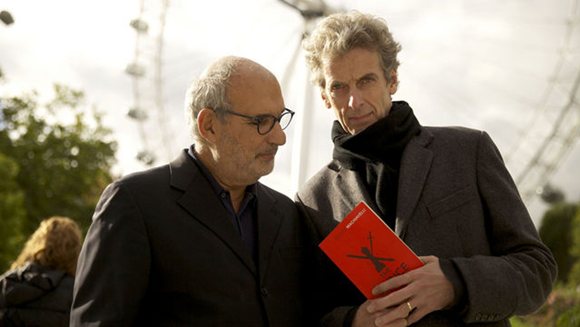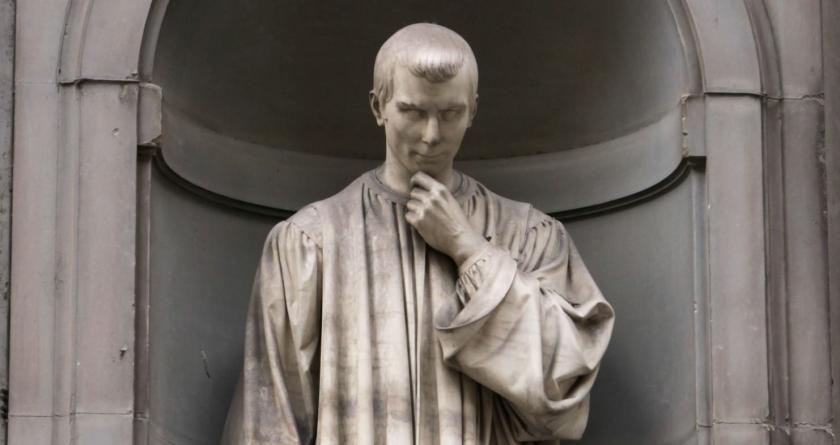There is a wonderful play to be written about the month in 1502 when Cesare Borgia was holed up in a castle in northern Italy with Leonardo da Vinci and Niccolò Machiavelli. Which of these two was working for the fearsome Borgia? Wrong. It was the creator of the Mona Lisa, not the author of The Prince. Machiavelli was a young diplomat of the new Florentine republic without a thought of realpolitik in his idealistic young head. Meanwhile back in Tuscany another young republican was working on that symbol of civic liberty, the statue of David.
It would be 10 years later that the Medicis grabbed back power in Florence and arrested and tortured Machiavelli. The trauma of the rack resulted in The Prince, the no-nonsense tract which advises that it’s better to be feared than loved, always advisable to crush your enemies, and if it serves the greater good then there’s really no need to keep your word. Half a millennium on, Machiavelli’s infamously cynical handbook is still a handrail for politicians, corporations, soldiers and, believe it or not, rappers.
For some reason nobody talked about sexing up the dodgy dossier
This lively edition of Imagine measured the long shadow of Machiavelli. There were a lot of cutaways to Tony Blair. Indeed, strip out the interviews with Machiavelli fans such as Hilary (Dragon’s Den) Devey and George RR (Game of Thrones) Martin and this was essentially a psychological profile of the Blair revolution.
Blair’s power grab was initiated, experts advised, by a classically Machiavellian stroke of good fortune. All princes need luck, and Blair’s was the sudden death of John Smith. No wonder Blair visited Machiavelli’s country villa on one of his Tuscan hols a year after gaining office. Although obviously he kept it shtum. His henchmen were harder to silence. Alastair Campbell explained how the threat of the reshuffle spread fear among Blair's cabinet in classic Machiavellian style. Jonathan Powell, author of a book called The New Machiavelli, recalled how for the greater good it was perfectly OK to be economical with the truth. For some reason nobody talked about sexing up the dodgy dossier.
The reason why The Prince was instantly banned by the Vatican was it uncoupled statesmanship from the consequences of Judgement Day. Machiavelli’s pragmatic prince might commit cardinal sins – lie and murder and wage war - and to hell with the carrot and stick of salvation and damnation. Maybe this is what Campbell really meant when he said “We don’t do God”.
 Meanwhile Peter Capaldi (the face of Campbell’s fictional avatar Malcolm Tucker) strode sulphurously about the Bargello and the Shard quoting from the unholy book. This was as close as the programme came to suggesting Campbell was that necesary Machiavellian archetype, the feared executioner who does the dirty work while the squeaky-clean boss looks the other way. Campbell still has the ability to take the breath away. Asked for an example of modern-day Machiavells, he innocently nominated the royal family.
Meanwhile Peter Capaldi (the face of Campbell’s fictional avatar Malcolm Tucker) strode sulphurously about the Bargello and the Shard quoting from the unholy book. This was as close as the programme came to suggesting Campbell was that necesary Machiavellian archetype, the feared executioner who does the dirty work while the squeaky-clean boss looks the other way. Campbell still has the ability to take the breath away. Asked for an example of modern-day Machiavells, he innocently nominated the royal family.
It wasn’t long ago that the very document recording the proclamation of Machiavelli’s arrest “within the hour” was dug up in Florentine archives. The Manchester University academic who found it proudly showed off his remarkable discovery. Another document of interest was the Machiavelli test which measures levels of ruthlessness. Yentob sat the test himself. Implausibly for someone who began slithering up the BBC’s greasy pole not long after the dawn of time, he scored less than average. Though of course any Machiavellian worthy of the name would have faked his answers. Even Yentob pointed this out. Machiavelli would recognise this as hiding in plain sight.















Add comment